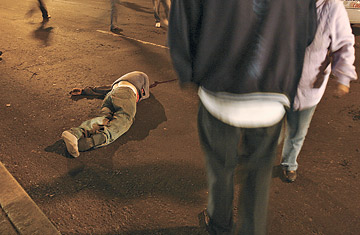
Federal Police agents arrest drug dealers during a raid in Mexico City, May 2008.
In Mexico city's breathtaking colonial cathedral, the faithful have icons of divine intervention for all occasions: a black Jesus Christ to heal the sick; a brown Virgin of Guadalupe to bring babies to newlyweds; a bearded St. Jude Thaddeus to find work. More recently, parishioners have sought a balm for another kind of suffering--kidnapping. Amid a wave of abductions, the Holy Captured Infant, a 3-ft.-high (1 m) statue of a child Jesus that was once snatched by pirates during its passage from Spain in the 17th century, has become the unofficial patron of kidnap victims. The statue receives regular visits from family members praying to free their loved ones, and it is sought out more than ever--the Mexican capital now has an estimated 500 abductions every year.
The surge in kidnapping is part of a wave of crime and lawlessness that has plagued the once safe and peaceful mountain city since the 1990s. Just a few decades ago, Mexico City boasted some of the lowest crime rates on the continent. That changed when the Mexican economy crashed in 1995, throwing millions out of work. In the following years, Mexico usurped Colombia as the drug-trafficking center of the Americas, unleashing heaps of crack cocaine, guns and narco dollars onto the street. Kidnappings, carjackings, rape, auto theft, burglary and murder followed and have become a near daily menace, creating an atmosphere of fear and suspicion in the streets. Despite a decade of periodic crackdowns, including a nationwide war against the drug trade launched by Mexican President Felipe Calderón in 2006 and mammoth anticrime marches, crime is still one of the key difficulties afflicting the 20 million people living in Mexico City's greater urban sprawl.
Similar stories can be heard from urban jungles the world over. In Moscow, Lagos and Johannesburg, violent crime is one of the top fears of residents and visiting businessmen. It raises the cost of commerce, scares off businesses and clients and causes immense suffering. In Mexico, the insecurity has continued into the 21st century even as the economy stabilized--violent crime is, in a sense, an industry--and police have appeared powerless to stop it, with 95% of crimes going unsolved. "The root of the problem is not poverty; it's impunity," says Jon French, a security consultant based in Mexico City. "If crime pays, then the bad guys keep committing it." And there appears to be no easy fix.
While Calderón has devoted more than 20,000 soldiers in a bloody war against the drug cartels, Mexico City has so far rejected calls to mobilize the army to keep the capital's streets safe. Instead, Mexico City is trying to replicate the success of New York City in breaking the grip of drug-related crime. In 2003 a group of businessmen paid $4 million to former New York City mayor Rudy Giuliani and a team including his former police chief Bernard Kerik (who later ran afoul of the law) to advise Mexico City on crime-fighting. After eight months of study, including a flyby visit from Giuliani to the city's most hardened barrios (at dawn, when most crooks were sleeping), the group delivered a report that advised cracking down on smaller crimes, just as the police had done in New York City.
Whereas Giuliani went after the so-called squeegee men, Mexico City's police chief at the time, Marcelo Ebrard, hit unlicensed street vendors, sending armies of police to reclaim the sidewalks, and he has accelerated his campaign since becoming mayor in December 2006. Ebrard has also struck at traffic offenses, forcing Mexico City drivers to wear seat belts. To improve surveillance, he has promised to install 8,000 security cameras in the city by the end of his term in 2012.
The tactic has had little effect on reported crimes so far, with rates remaining fairly stable over the past five years. But Ebrard promises it will bear fruit eventually. "This is a long-term fight," Ebrard told reporters recently. "And we are going to keep working at it." As in New York, this zero-tolerance approach has sparked criticism, with local human-rights groups complaining that it punishes the poor while failing to net the major villains.